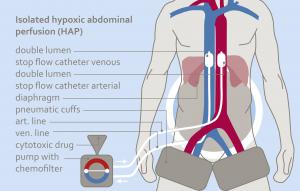Positive results of regional perfusion chemotherapy for progressive and refractory ovarian cancer made public today
Hypoxic abdominal perfusion for progressive and refractory ovarian cancer is an effective therapy offering comparably long survival at good quality of life
BURGHAUSEN, GERMANY, April 16, 2019 /EINPresswire.com/ -- Medias Klinikum GmbH & Co KG, a private hospital specialized in surgical oncology, focusing on the treatment of primary and metastatic solid tumors, announces the publication of an observational cohort study of 45 patients entitled Hypoxic Isolated Abdominal Perfusion (HAP) chemotherapy for non-operable advanced staged ovarian cancer with peritoneal carcinosis: an experience in 45 platinum-refractory ovarian cancer patients in the peer-reviewed Indian Journal of Surgical Oncology (DOI: https://doi.org/10.1007/s13193-019-00922-9), that was conducted by Professor Dr. Karl R. Aigner, one of the world’s most experienced experts in the field of regional chemotherapy, and his group. In 1981, he developed the technique of isolated liver perfusion and was the first physician worldwide performing this method in humans using a heart-lung machine.Commenting on the announcement, Professor Dr. Karl R. Aigner, Head of the Department of Surgical Oncology at Medias Klinikum, said, “Ovarian cancer is the leading cause of death among all gynecological cancers. The standard therapy option is still complete cytoreduction when possible, combined with chemotherapy. Despite initial response rates of 70–80% to platinum-based combination chemotherapies with taxanes, platinum-resistant recurrences occur very frequently within 2 years. The shorter the recurrence-free interval, the lower the prospect of a renewed response to chemotherapy. While increased drug exposure could theoretically lead to a renewed response, they are not universally administered due to increased toxicity. The limiting factor of augmented systemic drug exposure always had been the increasing toxicity such as neuropathy with hand–foot syndrome, neutropenia, or fatigue to the point of exhaustion. Since mortality rates of ovarian cancer remain high and have hardly changed in the last three decades, more recent treatment options are being tested in the context of molecular biology research.”
He adds: “Prolonging life while maintaining or improving quality of life should be the basic requirement for any cancer treatment. No other fundamental necessity for any treatment to be recommended should actually apply. In a comparative study, we therefore looked at patients who were in progression following systemic chemotherapy and were then treated with regional chemotherapy. The main endpoint of the trial was quality of life, overall survival, and clinical response rates:
Complete or partial response on clinical symptoms was noted among 36.3% of all patients in stages IIIB/C and IV. Stable disease was achieved in 51.1% of patients. Complete disappearance of ascites was observed in 30% of patients after only two perfusions; 43% of patients reported a substantial reduction of abdominal pressure and fluid volume and a considerable improvement in general wellbeing. Profit in terms of high response rates was achieved by increased tumor toxicity of the anticancer drugs under hypoxic conditions. Due to subsequent chemofiltration, systemic drug exposure was reduced and toxic side effects kept low. Quality of life generally was reported undisturbed.”
The method of regional chemotherapy in terms of isolated hypoxic abdominal perfusion with chemofiltration (HAP-F) for multiply pre-treated patients with progressive and platinum-refractory stage III and IV ovarian cancer, in fact is an effective therapy that can break through chemoresistance and offering comparably long survival at good quality of life.
This initial data have been supplemented by further results obtained with a larger number of patients and presented during an oral presentation at the this year’s 14th International Symposium on Regional Cancer Therapies of the Society of Surgical Oncology (SSO) in Phoenix, AZ, USA.
The updated data will be sent for publication within the next month.
About Medias Klinikum, Department of Surgical Oncology
Medias Klinikum is a private clinic located in Burghausen (Bavaria), Germany specialized in regional chemotherapy (RCT), a targeted treatment modality for primary and metastatic tumors that generates high locoregional drug exposure and is less toxic. Looking back at 40 years of expertise in this special field of surgical oncology, Prof. Dr. med. Aigner, the medical director of the clinic, is one of the world’s most experienced experts in this treatment method. He has given numerous lectures on RCT or performed guest operations in the most renowned institutions in the USA, Japan, China, Israel, Egypt, Australia and a number of other countries. In 1981, Professor Aigner developed a technique for performing the first isolated liver perfusion in humans using a heart-lung machine, and over subsequent years a variety of additional surgical procedures and specialized catheters for isolated therapy of organs and parts of the body, including the treatment of pancreatic carcinoma.
Public Relations
Medias Klinikum GmbH & Co KG
+49 8677 91600
email us here
Visit us on social media:
Facebook
Google+
Legal Disclaimer:
EIN Presswire provides this news content "as is" without warranty of any kind. We do not accept any responsibility or liability for the accuracy, content, images, videos, licenses, completeness, legality, or reliability of the information contained in this article. If you have any complaints or copyright issues related to this article, kindly contact the author above.

